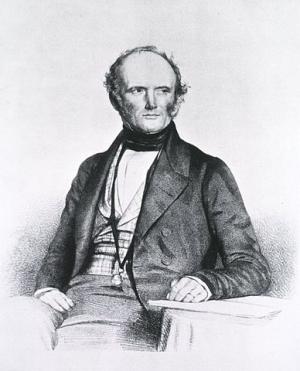
For anyone with a taste for the history of creationist shenanigans with scientific literature, Luther Tracy Townsend’s Collapse of Evolution (1905) is the gift that keeps giving. As Ronald L. Numbers notes in The Creationists (1992), in his book Townsend “assembled one of the earliest—and most frequently cribbed—lists in order to prove that ‘the most thorough scholars, the world’s ablest philosophers and scientists, with few exceptions, are not supporters, but assailants of evolution.’” As a result, whenever I start to investigate a quotation from or a citation of a scientist of a particular vintage, I’m not surprised to find that Townsend is the fons et origo. And here, from my recent cover-to-cover reading of Collapse of Evolution (which also inspired “A ‘Puerile Hypothesis’?” on a Townsendian misrepresentation of St. George Mivart), is a doozy.
In the text of Collapse of Evolution, under the heading “No Transmutation of Species by Natural or Artificial Processes,” Townsend discusses two phylogenies in particular: that of the horse and that of Homo erectus (the “Java Skeleton,” as he calls it, “[a]nother piece of effete evidence”). With regard to the horse, he dismisses the current scientific consensus by saying “geologists, on some of these questions, ‘have changed their views two hundred times in one hundred years,’ and that no reputable geologist, or paleontologist, at the present time is at all satisfied with the evidence of the horse pedigrees derived from those fossils.” (Townsend doesn’t identify the source of the “have changed their views two hundred times in one hundred years” remark; elsewhere he attributes it to “a distinguished”—but unnamed—“scientist,” whom I’ve been unable to identify.)
Attached to the quoted sentence is a reference to a note, printed at the end of the book, reading: “The following instance showing the changes that have taken place in geological science is vouched for by the eminent geologist, Professor Charles Lyell. ‘In the year 1806,’ he says, ‘the French Institute enumerated not less than eighty geological theories which were hostile to the Scriptures; but not one of those theories is held to-day.’” At first glance, there’s not much to worry about here. Lyell was certainly a leading geologist; he was a professor (of geology, at King’s College London, in the 1830s); and although he was a little young to take notice of the enumeration at the time (he turned nine in 1806), he certainly could have learned about it later. And the idea that geologists change their minds as science progresses is not really all that objectionable a claim in any case.
The problem emerged when I tried to locate a passage in his writings where Lyell makes such a claim. Lyell isn’t exactly Darwin, with a minor scholarly industry devoted to poring over his every word, but it’s not hard to find his major writings on-line. I looked through Principles of Geology (1830), Elements of Geology (1838), Travels in North America (1845), A Second Visit to the United States of North America (1849), The Antiquity of Man (1863), The Student’s Elements of Geology (1870), and the Life, Letters, and Journals (1881). And—wouldn’t you know it?—I couldn’t find the passage anywhere. Yet it was hard to believe that Townsend confabulated the quotation out of whole cloth: there’s something about the specificity of the year 1806 and the enumeration of not less than eighty theories that carries a certain degree of conviction.
In the event, I discovered a likely source for the quotation as well as a likely reason for the misattribution to Lyell. In 1840, Albert Barnes gave a talk on “The Progress and Tendencies of Science” at Marshall College in Mercersburg, Pennsylvania, which was subsequently printed as The Progress and Tendencies of Science (1840). Barnes (1798–1870) was a well-known Presbyterian minister and expositor of the Bible; he was on the New School side when the Presbyterian Church in the United States of America split in 1837. (Since I’m still reading a lot about the Civil War in my spare time, I will add that also with the New School was Lyman Beecher, the father of Harriet Beecher Stowe, the author of Uncle Tom’s Cabin [1852], and Henry Ward Beecher, at whose Brooklyn church Lincoln was supposed to speak before the venue was changed to Cooper Union.)
In his talk, Barnes was concerned to argue, “It is the tendency which is observable in all science to become tributary to revelation, and to confirm the great historical facts and doctrines of the Christian religion.” He addresses and dismisses arguments to the contrary from astronomy, linguistics, and archaeology, before turning to geology, remarking: “In 1806 the French Institute counted more than eighty such theories hostile to Scripture history, not one of which has stood to the present time.” That’s recognizably the passage quoted by Townsend, although Townsend clarified it by substituting “geological” for “such” and fancified it by substituting “enumerated not less than” for “counted more than.” But how did Townsend, reading Barnes’s The Progress and Tendencies of Science, come to attribute the passage to Lyell? I’ll explain in part 2.

